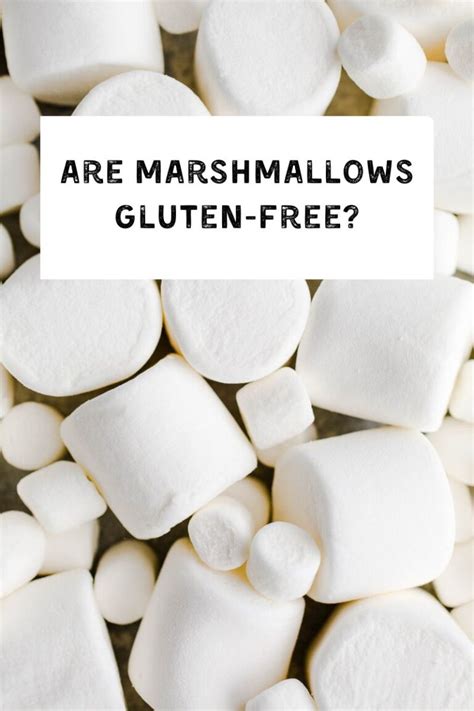Marshmallows are a popular treat that can be enjoyed in a variety of ways, from s'mores to hot chocolate toppings. However, for individuals with gluten intolerance or sensitivity, it's essential to know whether marshmallows are gluten-free. In this article, we'll delve into the world of marshmallows and explore what you need to know about their gluten content.
What are Marshmallows Made Of?
Before we dive into the gluten content of marshmallows, let's take a look at what they're typically made of. Marshmallows are a type of confectionery that's composed of:
- Gelatin: Derived from animal products, such as bones and connective tissue, gelatin is the primary component of marshmallows.
- Sugar: Granulated sugar adds sweetness and texture to marshmallows.
- Corn syrup: Corn syrup helps to bind the ingredients together and provides a smooth texture.
- Water: Water is added to help dissolve the sugar and corn syrup.
- Flavorings: Natural or artificial flavorings, such as vanilla or strawberry, can be added to give marshmallows a specific taste.
- Colors: Some marshmallows may contain artificial colors to enhance their appearance.

Are Marshmallows Gluten-Free?
The good news is that most marshmallows are gluten-free. The primary ingredients, such as gelatin, sugar, and corn syrup, do not contain gluten. However, it's essential to note that some marshmallows may be processed in facilities that also handle gluten-containing ingredients, which can lead to cross-contamination.
Additionally, some marshmallow products may contain gluten due to added ingredients, such as:
- Wheat-based ingredients: Some marshmallows may contain wheat-based ingredients, such as wheat starch or wheat flour, which contain gluten.
- Malt: Some marshmallows may contain malt, which is derived from barley and contains gluten.
- Flavorings: Some flavorings, such as malt flavoring, may contain gluten.

How to Choose Gluten-Free Marshmallows
If you're looking for gluten-free marshmallows, here are some tips to help you make the right choice:
- Check the ingredient label: Always check the ingredient label to ensure that the marshmallows do not contain any gluten-containing ingredients.
- Look for certification: Look for certification from organizations, such as the Gluten-Free Certification Organization (GFCO) or the Celiac Support Association (CSA), which ensure that the product meets gluten-free standards.
- Contact the manufacturer: If you're unsure about the gluten content of a particular marshmallow product, contact the manufacturer to ask about their gluten-free policies.

Gluten-Free Marshmallow Alternatives
If you're looking for gluten-free marshmallow alternatives, here are some options:
- Dandies: Dandies are a popular brand of gluten-free marshmallows that are made from natural ingredients.
- Sweet & Sara: Sweet & Sara offers a range of gluten-free marshmallows that are made from natural ingredients and are free from common allergens.
- Kettle Brand: Kettle Brand offers a range of gluten-free marshmallows that are made from natural ingredients and are free from common allergens.

Gallery of Gluten-Free Marshmallows






FAQs
Are all marshmallows gluten-free?
+No, not all marshmallows are gluten-free. Some marshmallows may contain gluten due to added ingredients, such as wheat-based ingredients or malt.
How can I ensure that my marshmallows are gluten-free?
+Check the ingredient label, look for certification from organizations, such as the GFCO or CSA, and contact the manufacturer if you're unsure about the gluten content of a particular marshmallow product.
What are some gluten-free marshmallow alternatives?
+Some popular gluten-free marshmallow alternatives include Dandies, Sweet & Sara, and Kettle Brand.
In conclusion, while most marshmallows are gluten-free, it's essential to be aware of the potential risks of cross-contamination and added ingredients that may contain gluten. By choosing gluten-free marshmallow alternatives and following the tips outlined in this article, you can enjoy marshmallows while maintaining a gluten-free diet.
